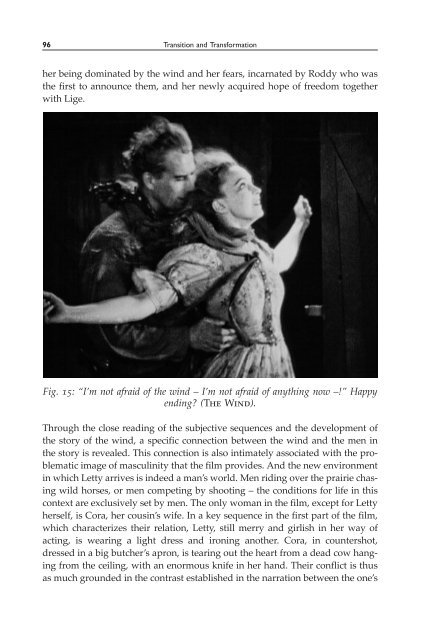FILM FILM - University of Macau Library
FILM FILM - University of Macau Library
FILM FILM - University of Macau Library
Create successful ePaper yourself
Turn your PDF publications into a flip-book with our unique Google optimized e-Paper software.
96 Transition and Transformation<br />
her being dominated by the wind and her fears, incarnated by Roddy who was<br />
the first to announce them, and her newly acquired hope <strong>of</strong> freedom together<br />
with Lige.<br />
Fig. 15: “I’m not afraid <strong>of</strong> the wind – I’m not afraid <strong>of</strong> anything now –!” Happy<br />
ending? (The Wind).<br />
Through the close reading <strong>of</strong> the subjective sequences and the development <strong>of</strong><br />
the story <strong>of</strong> the wind, a specific connection between the wind and the men in<br />
the story is revealed. This connection is also intimately associated with the problematic<br />
image <strong>of</strong> masculinity that the film provides. And the new environment<br />
in which Letty arrives is indeed a man’s world. Men riding over the prairie chasing<br />
wild horses, or men competing by shooting – the conditions for life in this<br />
context are exclusively set by men. The only woman in the film, except for Letty<br />
herself, is Cora, her cousin’s wife. In a key sequence in the first part <strong>of</strong> the film,<br />
which characterizes their relation, Letty, still merry and girlish in her way <strong>of</strong><br />
acting, is wearing a light dress and ironing another. Cora, in countershot,<br />
dressed in a big butcher’s apron, is tearing out the heart from a dead cow hanging<br />
from the ceiling, with an enormous knife in her hand. Their conflict is thus<br />
as much grounded in the contrast established in the narration between the one’s

















